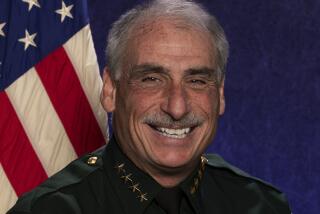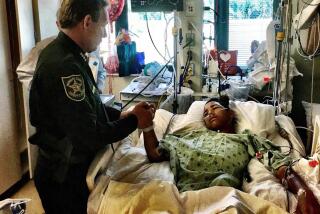Nikolas Cruz was investigated after cutting himself on Snapchat, state report shows
Reporting from PARKLAND, FLA. — Nikolas Cruz cut his arms on Snapchat and said he wanted to buy a gun in September 2016, more than a year before he was accused of killing 17 people in a school in Parkland, records show.
The incident on the digital social network prompted an investigation by sheriff’s deputies and adult welfare investigators from the Department of Children and Family Services.
The documents obtained by the South Florida Sun Sentinel provide further evidence that Cruz was a troubled teen who repeatedly went without help before he stalked the halls of Marjory Stoneman Douglas High School with an AR-15 rifle on Wednesday.
In another example, the FBI acknowledged Friday that it ignored a tip last month that Cruz was at risk of committing a school shooting.
A person close to Cruz contacted an FBI national tipline on Jan. 5 with concerns about the young man’s “gun ownership, desire to kill people, erratic behavior, and disturbing social media posts, as well as the potential of him conducting a school shooting,” the agency said in a news release.
The information should have been sent to the FBI Miami Field Office but was never forwarded, officials said. U.S. Atty. Gen. Jeff Sessions on Friday ordered an investigation of how the U.S. Department of Justice and FBI handled the matter.
The Children and Family Services investigation came four days after Cruz’s 18th birthday, meaning he could legally purchase a rifle.
“Mr. Cruz has fresh cuts on both his arms. Mr. Cruz stated he plans to go out and buy a gun. It is unknown what he is buying the gun for,” the agency report reads.
Investigators concluded there were “some implications” for Cruz’s safety but determined he was receiving adequate support from his school and outpatient care from Henderson Mental Health in Broward County.
About five months later, he bought the AR-15.
Cruz came under Children and Family Services’ supervision and care because he was classified as a vulnerable adult due to mental illness. “[Cruz’s] final level of risk is low as [he] resides with his mother, attends school and receives counseling through Henderson,” the investigator wrote.
Cruz’s lawyers said the report is the clearest evidence yet that the system failed. “All of this could have been prevented,” said Melisa McNeill, the Broward assistant public defender who is leading the defense. “It makes me sick to my stomach because there are 17 people, including numerous children, who are dead and several others who are injured.”
The attorneys said the Snapchat incident alerted at least four local agencies — Children and Family Services, the Broward Sheriff’s Office, the Broward school district and Henderson Behavioral Health, one of the largest mental health providers in the county — that Cruz was in crisis and posed a potential danger to himself and others.
“Every single red flag was being thrown up by this kid, four days after his 18th birthday, and nothing was done to help him,” said Chief Assistant Public Defender Gordon Weekes. “This community has been devastated. The system didn’t only fail him, it failed the entire community.”
McMahon, Hobbs and O’Matz write for the Sun-Sentinel.
More to Read
Sign up for Essential California
The most important California stories and recommendations in your inbox every morning.
You may occasionally receive promotional content from the Los Angeles Times.










